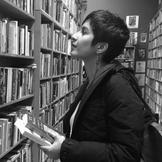Dr. Sumayya Kassamali

Harvard University
Global Humanities Junior Research and Teaching Stay at Freie Universitaet Berlin
Sumayya Kassamali holds a PhD in Anthropology from Columbia University (2017), where her dissertation focused on the lifeworlds of African and Asian migrant workers in Beirut, Lebanon. Her larger research asks how belonging is forged under conditions of structural exclusion and urban violence, and she is additionally interested in the politics of post-9/11 North America, the War of Terror, and the cultures of the contemporary Middle East.
Teaching Slot within the Summer School 2018:
Urban Exile: Anthropology, the Humanities, and Thinking Outside the Categories of the State
This session draws upon anthropological research conducted within spaces of Beirut, Lebanon, where female African and Asian domestic workers, male Arab and Kurdish refugees, and Lebanese citizens have come together to transform the city. It draws upon Edward Said’s notion of “exile” to put forward an imagination of social relations in the city that cannot be circumscribed by the legal-administrative designations of “migrant worker”, “refugee”, or “citizen.” How might fieldwork allow us to attend to the ways in which life exceeds the categories of the state? What is the role of the urban in cultural transformation, particularly in contexts with rapidly shifting demographics? And how do spaces of precarity, uncertainty, and violence also forge new visions of freedom and collectivity?
Migrant Worker Lifeworlds of Beirut
Sumayya's project examines an informal labour sector in the capital city of Lebanon, a country home to over half a million African and Asian domestic workers and approximately one million Syrian refugees. The work discovers a Beirut where inhabitants excluded from citizenship and political recognition have built a set of religious and commercial establishments, informal services, community rituals, internal codes, ways of speaking Arabic, and underground spaces for leisure, consumption, and desire. Drawing on two years of fieldwork, the research shows how these communities have come together in an urban exile that has enabled new kinds of sociality and politics both.
